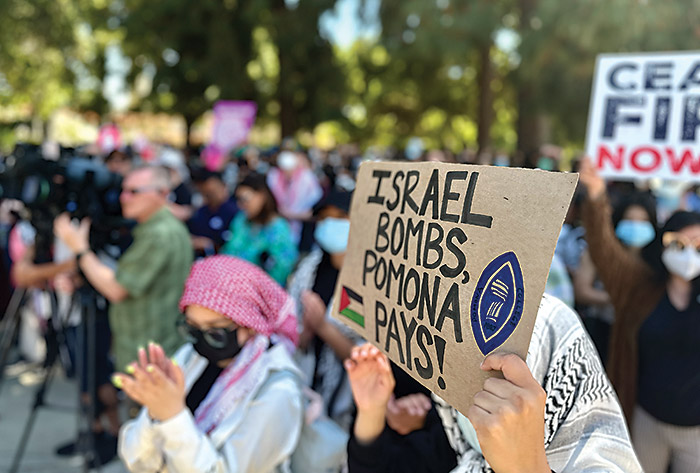ACLU asserts Pomona College violated state, federal laws

Claremont Colleges students protesting in April outside Honnold Mudd Library. Courier photo/Peter Weinberger
by Andrew Alonzo | aalonzo@claremont-courier.com
Earlier this month, Pomona College received a joint letter from the American Civil Liberties Union, among others, asserting the school’s recent suspension of 10 students for the academic year due to their alleged participation in a October 7 protest at Carnegie Hall may have violated their rights, and that a lawsuit may be filed to challenge the decision.
The November 13 letter was co-signed by the Asian Law Caucus, Palestine Legal, the Center for Protest Law and Litigation, National Lawyers Guild of Los Angeles, and the ACLU Southern California. It called on Pomona College to immediately lift the suspensions.
“The student suspensions, and the peremptory manner they were imposed in, violate the students’ rights under California law,” reads the letter. “Imposing discipline for that is a violation of the student’s rights to free speech, expression, and association under California’s Leonard Law, which extends the full protections of the First Amendment to students at private postsecondary institutions, including Pomona College. Additionally, suspending the students without providing them with a meaningful opportunity to be heard violates their due process rights … In California, some disciplinary decisions of private institutions are subject to the common law doctrine of Fair Procedure.”
The signatories requested Pomona College respond by November 20, and include “the steps you will take to conform the College’s actions to the law. If the College refuses to change course, we reserve the right to take any necessary legal action to vindicate the rights of the students.”
On Wednesday, Tori Porell, a staff attorney at Palestine Legal, wrote that Pomona College had not yet responded to the letter. “The signatories are considering legal action, such as a lawsuit to address the violations of law explained in the letter,” Porell said.
Niketa Kumar, communications director of the Asian Law Caucus, wrote in an email after press time Thursday that Pomona College administrators had requested until Monday, November 25 to respond to the letter.
Pomona College did not respond to the Courier’s repeated attempts to reach them for comment on the previously missed deadline.
The letter also referenced an August 6 investigation launched by the United States Department of Education’s Office for Civil Rights aimed at determining if Pomona College violated Title VI of the Civil Rights Act of 1964.
“On April 9, 2024, the U.S. Department of Education (the Department), Office for Civil Rights (OCR) received a complaint against the Pomona College (the College),” the letter announcing the investigation read. “The complaint alleged that, since October 2023, the College discriminated against students based on their actual or perceived national origin (Palestinian, Southwest Asian and North African (SWANA), and Muslim shared ancestry) by engaging in actions that made these students feel unsafe and unwelcomed, by failing to respond effectively to incidents of harassment of these students by other students, third parties, and employees, and by engaging in disparate treatment of these students.”
Pomona College Interim Chief Communications Officer Patricia Vest responded to the letter in a November 15 written statement to the Courier.
“The College has strong defenses to the claims of the letter, including that our decisions are based on the individual’s participation in a material disruption inside an academic building during work hours, not on speech or expression,” the statement from Vest read. “The takeover of Carnegie on Oct. 7 targeted our academic mission and significantly disrupted the educational process of more than 600 Pomona and Claremont Colleges students, as well as the ability of faculty and staff to continue to perform their work in support of the academic functions of the College.
“This group of students were charged with violations of The Claremont Colleges demonstration policy and the Student Code and were initially placed on interim suspension. In conformity with the extraordinary authority delegated to the president by the Board of Trustees, these cases were not required to be subject to discipline by the Judicial Council. Rather, as laid out in the Student Code, these cases followed the extraordinary authority procedure reserved for events that meet three conditions:
- they threaten safety of individuals on campus,
- involve the destruction of College property, and
- the disruption of Pomona’s educational process.”
Vest wrote that Pomona offered to pay for transportation home for the suspended students.
This story was updated at 3 p.m. Monday, November 25.







0 Comments